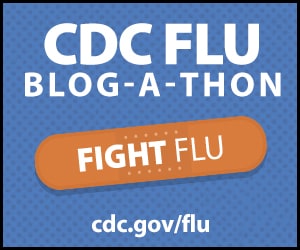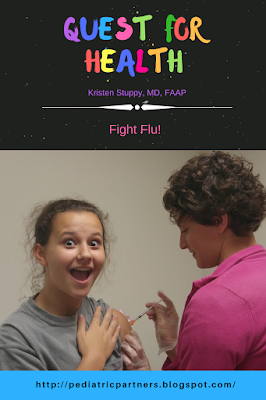There's good news though. There's a vaccine to help prevent the flu.
There are many reasons people don't get the flu vaccine, but many of those reasons deserve a second thought.
1. The flu vaccine doesn't work.
While it's true that the vaccine has variable efficacy, it's important to get the vaccine each year. The more people vaccinated, the less likely the flu will spread through a community. Take a look at this really cool representation of how herd immunity works. How it was developed is described on IFLS.
No one claims that the vaccines against influenza work perfectly. The influenza virus can mutate by shifting and drifting. Until there's a universal flu vaccine, we must rely on experts to look at the viral patterns and predict the strains that will be most predominant in the upcoming season and make a vaccine against those strains.
Despite not working 100% of the time, the flu vaccine has been shown to lessen the severity of illness and decrease hospitalizations and deaths. Even if there's not a perfect match, it can still help those who are vaccinated have a lesser illness. That's worth something.
2. I got the flu from the vaccine.
The influenza vaccine that is currently available cannot cause the flu. Only live virus vaccines can lead to forms of the disease. The vaccines available in the US this season are either an inactivated or a recombinant vaccine. These do not cause flu symptoms. The vaccines cannot mutate to cause symptoms. They simply don't work that way.
There are many reasons you could have gotten sick after a flu vaccine that were not due to the vaccine.
- You were exposed to influenza before the vaccine had time to take effect and protect.
- You caught a strain of influenza that wasn't covered in the vaccine.
- You caught one of a number of other viruses that cause flu - like illness.
- The vaccine did cover the type of virus you have but your body didn't make the proper protection from the vaccine so you were still susceptible.
The FluMist is a live virus vaccine, so it could cause mild symptoms of influenza viruses, but it is not recommended for use in the US this year.
3. I can prevent the flu by being healthy.
It is important to eat right, exercise, get the proper amount of sleep, and wash hands. All of these things help keep us healthy, but they don't prevent the flu reliably.
We cannot boost our immune system with megadoses of vitamins. (Vaccines are the best way to boost our immune system.)
Organic and non-GMO foods don't offer any benefit to our immune system over other healthy foods. If these things did as some claim, people generations ago would have been healthier since they ate locally grown organic foods, got plenty of fresh air, and exercised more in their day to day life than we do these days. Instead of being healthier, they were much more likely to die from infections. The risk of death between the first and 20th birthday had decreased from over 3 in 100 children in 1900, to less than 2 in 1000 children today. One of the major causes of death historically (and still today) is from influenza, but it has been shown that the flu vaccine reduces the risk of death. Why not help your body prepare for flu season with the vaccine?
4. Flu vaccines shouldn't be used during pregnancy -- they've never been tested and can lead to miscarriage.
There are some who assert that since the package inserts state the vaccines have not been studied in pregnancy that they aren't safe, but in the next breath they say that they aren't safe because a study showed a high rate of miscarriage after the vaccine.
The first part of the argument is one of the many ways the package insert is misused. Discussions about using package inserts properly are found at The Logic of Science, another at The Logic of Science, Skeptical Raptor, Harpocrates Speaks, and even this analogy of Package Insert Airline to vaccine package inserts.
Think about it... you can't argue that it's never been studied and then quote a study. It's been studied. A lot. The Vaccine Safety Datalink is a huge database designed to document adverse events associated with vaccination, allowing researchers access to a large amount of data.
5. I have a chronic illness and don't want to get sick from the shot.
People with chronic illnesses (including diabetes, heart conditions, and asthma) are more at risk from serious illness from influenza disease. The influenza vaccine can prevent hospitalizations and death among those with chronic diseases. People with chronic diseases should be vaccinated, as should those around them to protect with herd immunity.
The flu shot cannot make anyone sick, even those who are immunocompromised. You do not need to avoid being around someone who is sick or immunocompromised if you've recently been vaccinated.
6. If I get the flu I'll just take medicine to feel better.
There is no medicine that makes people with influenza feel better reliably.
There is no medicine that decreases the spread of influenza to friends and family of those infected.
We can take fever reducers and pain relievers, but they don't treat the underlying virus. They suppress our immune system so we don't make as much inflammation against the virus, which decreases the symptoms and our body's natural defenses.
Cough and cold medicines simply don't work well.
As for antiviral medicines, I have written about Tamiflu previously and why I rarely recommend it.
Megadoses of vitamin C or other vitamins, homeopathic treatments, essential oils, and other at home treatments have not been shown to significantly help.
It is important if you get sick, you should limit contact with others. This means missed school and work for at least several days with influenza. Prevention with the vaccine simply is better than trying to treat the symptoms.
7. I don't like shots. (Or my child doesn't like shots.)
I'm a pediatrician. Most of my younger patients hate shots. Like really hate shots. They cry, scream, kick, try to run and hide -- you name it, they've tried it to try to avoid shots. They fear shots, but we can help them with techniques that lessen the pain, and they often say "it wasn't that bad" afterwards. For more on how we can help lessen the pain, check out Vaccines don't have to hurt as much as some fear.
8. I have an egg allergy so can't get flu shots.
In previous years there was a concern that people with egg allergy would have a reaction from the vaccine so it was not recommended, but it has been found to be safer and still appropriate to vaccinate with proper precautions.
People who have had only hives after egg exposure can safely get flu vaccines following standard protocols.
People who have symptoms of anaphylaxis with egg exposure that requires epinephrine (respiratory distress, lightheadedness, recurrent vomiting, swelling - such as eyes or lips) should still get the vaccine, but they should be monitored at the appropriate facility (doctor's office, hospital, health department) for 30 minutes to monitor for reactions.
9. Vaccines are only promoted to make people money. Doctors are shills.
Very little profit is made from any vaccine. Really. Some doctors and clinics lose money by giving vaccines. I often tell my own patients that I don't care if they get the vaccine at my office, the local pharmacy, or at the parent's office - whatever works for them best. I just want everyone vaccinated. This in the end will decrease my revenue because they will not come to the office seeking treatments for a preventable illness. But I am a pediatrician to take care of the health of children, not to make money. Pediatricians are consistently on the bottom of the list of physician salaries. If I was in it for the money, I would have gone into orthopedics or another surgical specialty.
There are many things to consider when addressing this argument and the Skeptical Raptor does it well, including links to more information.
10. The flu vaccine contains mercury.
While it is true that some flu vaccines contain thimerosal, not all do. Thimerosal was removed from the majority of childhood vaccines in 2001 due to lawmakers responding to constituent demands, not because it was shown to be a risk medically. Since the flu vaccine is not only for children, there are multidose vials that contain thimerosal. If that really bothers you, ask for a version without thimerosal. But since it was removed because people thought thimerosal caused autism and the rates of autism haven't gone down since it was removed, that's pretty strong evidence that it never caused autism. Just like the scientists said. It's a preservative that is effective. I would gladly get a flu vaccine with thimerosal, and have over the years, but the majority of flu vaccines given to children in the US are thimerosal free. Just ask.
Flu Vaccine Information and Recommendations for the 2017-2018 Season
- Both trivalent (3 strain) and quadrivalent (4 strain) vaccines are approved for use this year. There is no preference officially of one over the other, but the vaccine should be appropriate for age.
- No FluMist Nasal Spray flu vaccine is recommended. The nasal spray did not work well in the last few seasons it was used in the US. Until it is understood why it wasn't effective then how to make it effective, it will not be recommended.
- Pregnant women should be vaccinated to protect themselves and their baby.
- Everyone over 6 months of age should be vaccinated. Children 6 months to 8 years who have only had one flu vaccine in their past will need two doses this season. This is because the first dose acts as a primer dose, then a booster dose boosts the immune system. Once the body has had a boost, it only needs a boost each year to improve immunity.
- Infants under 6 months of age can gain protection if their mother is vaccinated during pregnancy and if everyone around them is vaccinated. They cannot get the flu vaccine until 6 months of age.
- People with egg allergy can be vaccinated. If there is a history of anaphylaxis to egg, they should be monitored for 30 minutes.
- The CDC is encouraging everyone to be vaccinated by Halloween if possible, but it's not too late to be vaccinated after that if not yet done this season. It takes up to 2 weeks for the vaccine to be effective. Flu season typically starts in January, but the peak can be as early as November and as late as March.
- It is acceptable and encouraged to give the flu vaccine along with other recommended vaccines needed.

Related blogs
Tamiflu: Guest blogger Dr. Mark Helm
Tamiflu Status Downgraded


No comments:
Post a Comment